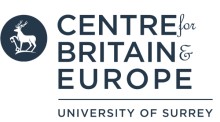

Jean Monnet Centre of Excellence
The Centre for Britain and Europe (CBE) was awarded the prestigious Jean Monnet Centre of Excellence from the European Union for 2020-2023.
Overview

The Jean Monnet Programme is an initiative established by the European Union (EU) to promote excellence in teaching and research in the field of European integration studies. It is named after Jean Monnet, regarded as one of the founders of the European Union and a strong advocate for European integration.

As a Jean Monnet Centre of Excellence, CBE plays a key role in reaching out to students from faculties not normally dealing with European Union issues as well as to policy makers, civil society and the general public at large, whilst offering experts the opportunity to create joint transnational activities. Additionally, CBE gathers the expertise and competences of high-level experts aiming to develop synergies between the various disciplines and resources in European studies.
Five pillars of Jean Monnet
CBE’s initial Open Doors and Building Bridges programme is structured around four constitutive project strands, with one cross-thematic category of European/Britain activities. These are:
- Gender and identity: Exploring the origins, impacts and consequences of rapidly shifting identity politics and gender politics in Europe and the UK on current and future integration.
- Electoral behaviour: Researching the science of elections in Europe and Britain to discover the sources of both regressive tendencies, worsened by image and social media, and progressive trends of transparency, thematic advocacy (e.g. climate change) and youth-based interest.
- European and British security and defence: Investigating the material and policy-based risks and opportunities arising within EU defence and security initiatives, and post-Brexit impacts on UK-EU security and defence structures, with member state findings from Poland, Germany, the UK, France and Belgium.
- De-Europeanisation and re-Europeanisation: A two-fold exploration of the profound risks of ‘tipping points’ in key European phenomena. This includes populism, disenfranchisement and critical challenge in forms of European dis-integration including Euroscepticism, and the surprising new opportunities to reconnect, re-establish and re-communicate within and between EU politics and between the EU and the UK as post-membership entities.
- Cross-thematic outputs: A range of entirely new teaching activities, research outputs, deliverables and events, tying together the substantive themes of identity/gender, security/defence, and de/re-Europeanisation.
In 2023, CBE’s work continues to evolve to encompass wider areas of global politics. These five pillars are now decanted into six areas of:
Jean Monnet Chairs
A Jean Monnet Chair is a prestigious academic position and designation within the Jean Monnet Programme, which is an initiative funded by the European Union (EU) to promote excellence in teaching and research related to European integration studies. Jean Monnet Chairs are awarded to distinguished scholar or academic who has demonstrated outstanding expertise and a strong commitment to teaching and research in the field of European Union studies.

Jean Monnet Chair 2019 - present
Dr Laura Chappell
Senior Lecturer in European Politics
Overview
Dr Laura Chappell took over the Jean Monnet Chair in 2019. Laura's research focuses on the EU’s Common Security and Defence Policy (CSDP), including defence capability development and military operations, as well as Polish security and defence policy. More recently she has been using a gender perspective to explore CSDP and the European External Action Service. She teaches a range of modules including engendering world politics, security and diplomacy in Europe, international security and defence and key issues in international politics.

Jean Monnet Chair 2017-2019
Professor Roberta Guerrina
Professor, School of Sociology, Politics and International Studies, University of Bristol
Overview
Professor Roberta Guerrina was awarded the Jean Monnet Chair in 2017. She has published widely on gender politics of the European Union, the unintended gender consequences of mainstream EU policies, such as the CSDP, and gendering Brexit. She teaches modules on European integration and disintegration, and engendering world politics. In 2019 she moved to the University of Bristol as Professor of Politics and Director of the Gender Research Centre.
